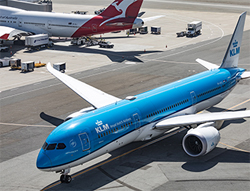Foreign Air Carriers (Part 129)
 Foreign air carriers or operators who would like to conduct passenger or cargo operations to, from, and transiting the United States, must obtain a permit issued by the Department of Transportation (DOT) under Title 49 of the United States Code (49 U.S.C.). The Federal Aviation Administration (FAA), International Field Offices (IFO) are responsible for issuance and amendment of foreign air carrier operation specification (OpSpecs). Operating standards governing foreign operators are contained in Parts 91 and 129.
Foreign air carriers or operators who would like to conduct passenger or cargo operations to, from, and transiting the United States, must obtain a permit issued by the Department of Transportation (DOT) under Title 49 of the United States Code (49 U.S.C.). The Federal Aviation Administration (FAA), International Field Offices (IFO) are responsible for issuance and amendment of foreign air carrier operation specification (OpSpecs). Operating standards governing foreign operators are contained in Parts 91 and 129.
Each foreign air carrier conducting operations within the United States must conduct its operations in accordance with the Standards contained in Annex 1 (PDF) (Personnel Licensing), Annex 6 (PDF) (Operation of Aircraft), Part I (International Commercial Air Transport–Aero planes) or Part III (International Operations–Helicopters), Annex 8 (PDF) (Airworthiness of Aircraft) and Annex 18 (PDF) (The Safe Transport of Dangerous Goods by Air).
Regulations outlining the acceptance, handling, transport of dangerous goods and required training are found in the Hazardous Material Regulations (49 CFR Parts 100-185) and the International Civil Aviation Organization (ICAO) Technical Instructions (TI) for the Safe Transportation of Dangerous Goods by Air. Compliance with the ICAO TI (including U.S. State Variations) as well as 49 CFR 175 regulations is mandatory for all Part 129 air carriers.
Hazardous Materials Aviation Safety Inspectors (HMASIs) inspect Part 129 air carriers at multiple locations throughout the United States and its territories to ensure safety and compliance with the regulations. Part 129 air carriers who accept, handle, and transport hazardous materials have Principal Hazardous Materials Inspectors (PHIs) assigned who closely oversee their Hazardous Materials Programs.
